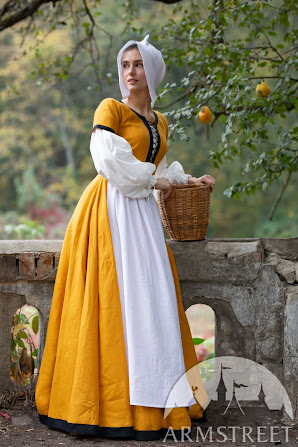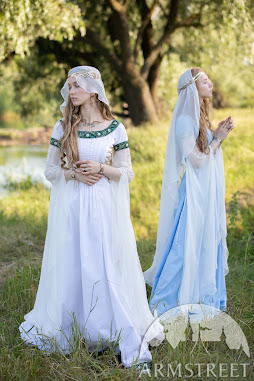Though
as fragile as a butterfly’s wing,
and as
prone to dust-like constitution . . .
the
daisies of the field in profusion,
a
star-like innocent voice rose to sing.
There
was one ray, through which the sunlight beamed,
there
was one meadow, she sat undisturbed,
her
child-like hands had never been blistered,
not
called to work, but paradise, she seemed.
She sat
by the window, with her sewing:
her
hands moved back and forth in counterpoint,
their
whitely-held countenance was a wand,
conjuring
teal magic not her doing.
What in
her being she poured out anoints
savoury
plate, previously mild sands.
Ophelia
was a maid enraptured,
slightest
ladybug called her attention,
flight
of eagles she made duly mention,
if a bird
landing on your hand—captured.
Red
hair, threaded with pearls, in minute form
gave
license to the braids of yesteryear,
her
bright new purple eyes would shed a tear
if she
found a hare was sorely tortured.
Her
cream-like skin was crystal-dewy smooth
the harsh
sun’s rays not dilapidating,
and
pierced cloud had shed its clear light downward,
where
highlights of her vision not removed,
the
storm in her breast not now abating,
fury of
her voice resounded onward.
With
her frail throat she verbalized discourse,
she
pleaded with the dragons of disdain,
and
from her vial of juice now dripped a stain,
while
she, distracted, remedied remorse.
The
perfect loaves dropped from her hands, table
ready
to receive them, although not her.
She
knew she had no ceremonial
redemption
from within; horse in stable
was next
saddled to take her far away
to the
forests, where she picked hollyhocks,
to the
inland river where she would bend
for
direction from inner voices late
that
would lessen their blue scourge and torment
if she
would heed their counsel, to good end.
Humble
monarchs of the meadow landed
upon
fennel, columbines, pale lily,
converging
in wild gardens ’midst the wood
on her
lithe and wax-like hands, enchanted.
Here,
whispered light-hearted incantations,
for
this pillar of stone now breathed into
the
stillness of the mortal dawn, imbue
all
matter with her voiced lamentations.
She was
character of limpid softness
yet the
bones of her small frame were rigid,
and
each sinew held her dear together.
Her structure
composed inert gracefulness
and her
darkling eyelashes drew frigid
stares
from under townspeople’s brown feathers.
She was
both green of the wood, and winter,
the
frosted land, both desirous and black
at
once, cold and unyielding, giving flack
like an
undecorated old spinster.
She
both bright-blossomed and fell to the ground,
unlike
seasons presiding majestic
over
universe and the gavel’s lick
of
wide-dealt justice, even deep-founded.
What
other wise women maintained, she lost,
as
fallen spray of fragrance to ’lil earth
as
baskets disperse the wedding flowers,
as wool
has fallen prey to powdered moths;
destiny
and its dreams traded for mirth,
famine
and fear now traded for bowers.
O
Ophelia, my love, the sweetness
of the
pleasant spring would unduly croon,
with
potions that were remedies of moon,
and by
your second-sight, your heavy breast
is
ribboned by your green watery rest
and
lucid rambles as your ship winds ’round
the
brambles of infernal stony ground.
Flying
straw-like limbs in constancy, drowned,
in
earnestness, proper prayer-like anguish
beneath
great spreading tree of green-clothed life.
You
would mediate between chastity
and
fertility, if one outdistance
the
other; the craft of poetry, ice
upon
the outstretched hands of charity.
Velvet
tie that once secured her bonnet
now
ties gentle waist to the bottom’s murk
where
river nyads dance and aged lurk
to tap
her gentil forehead in the net.
Abandoned
fish will wander, silver, here,
and
children peer beneath the ghostly air,
with
their white dresses billowing, with fair
remembrances
of her who sat so near.
She, at
the paned window sang so sweetly,
she,
around her neck, had worn daisy chains,
her
hands held life’s grievance like a bouquet.
Still a
child in thought, could think so kindly,
now
victim with no succor in her pain:
bottom
of the glass river’s tourniquet.
Emily Isaacson







